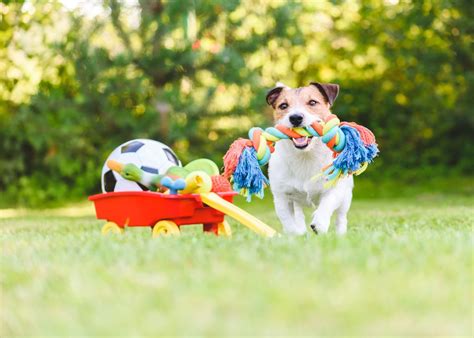Introduction

Puppies, those adorable bundles of energy, require proper care and attention to thrive. Among the essential aspects of puppyhood is providing them with appropriate toys and engaging them in play. This article delves into the importance of dog toys and play for puppies, offering insights into the benefits, types, and best practices for ensuring a fulfilling and healthy life for your furry friend.
Importance of Dog Toys and Play for Puppies
Cognitive Development: Play and toys stimulate a puppy’s cognitive abilities, helping them learn about their environment and develop essential problem-solving skills.
Physical Health: Toys provide an outlet for puppies to expend their boundless energy, promoting physical fitness and reducing the risk of weight gain.
Emotional Well-being: Play and toys alleviate stress, boredom, and anxiety, contributing to a puppy’s overall happiness and well-being.
Bonding with Owners: Engaging in play with your puppy fosters a strong bond between you and your pet, strengthening communication and trust.
Types of Dog Toys for Puppies
Chew Toys: These toys satisfy puppies’ natural chewing instinct, preventing them from destructive behavior. Consider options made of durable materials such as rubber, nylon, or antler.
Puzzle Toys: Puzzle toys provide mental stimulation and encourage problem-solving. They often involve hiding treats or requiring the puppy to manipulate the toy to release them.
Interactive Toys: These toys engage puppies through movement, noise, or both. Examples include ball launchers, tug-of-war toys, and remote-controlled toys.
Sensory Toys: Sensory toys cater to puppies’ senses of sight, sound, smell, and touch. They can include toys with different textures, squeakers, or aromatic inserts.
Choosing the Right Toys
When selecting toys for your puppy, consider the following factors:
- Age and Size: Choose toys that are age-appropriate and sized for your puppy’s mouth and body.
- Materials: Opt for toys made from safe and durable materials that won’t pose a choking hazard.
- Temperament: Consider your puppy’s temperament and activity level when choosing toys. Active puppies may prefer interactive toys, while calmer ones may enjoy puzzle toys.
- Safety: Inspect toys regularly for damage and discard any that are torn or broken.
Playtime for Puppies
Regular playtime is essential for puppies’ well-being and development. Aim for several short play sessions throughout the day, tailored to the puppy’s age and energy level.
Benefits of Playtime:
- Training: Playtime provides opportunities to teach puppies commands and reinforce desired behaviors.
- Socialization: Playing with other puppies or people helps socialize puppies and prevents aggression.
- Physical Exercise: Playtime burns off excess energy and promotes a healthy weight.
- Mental Stimulation: Play engages puppies’ minds and ensures they remain active and alert.
Playtime Tips
- Supervise Play: Always supervise your puppy while playing, especially with new toys or around other animals.
- Rotate Toys: Regularly rotate toys to prevent boredom and maintain interest.
- Quality over Quantity: Fewer high-quality toys are better than a large collection of cheap, disposable toys.
- Play with Purpose: Engage in play that promotes your puppy’s physical, mental, and emotional well-being.
- End on a Positive Note: Always end playtime on a positive note, leaving your puppy with a happy memory of the experience.
Conclusion
Dog toys and play are indispensable for the development and well-being of puppies. By providing appropriate toys and engaging in regular playtime, you can ensure a fulfilling and healthy life for your furry companion. Remember to consider your puppy’s age, size, temperament, and safety when choosing toys. Most importantly, make playtime a bonding experience that strengthens your relationship with your puppy and brings both joy and fulfillment.





















